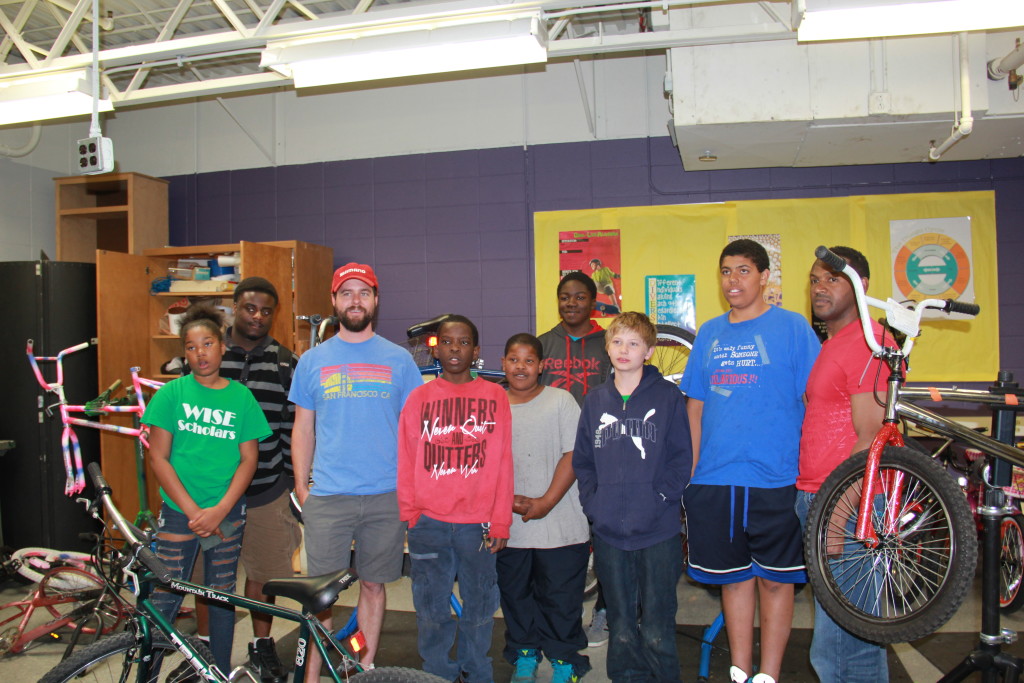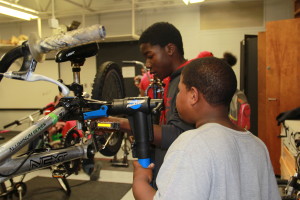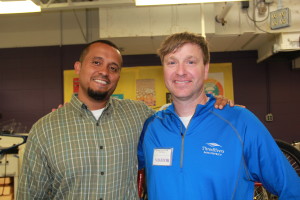
On the afternoon of May 13, several Brooklyn Center Secondary School students gather in Room 224.
They’re members of the school’s 21st Century Bike Club, an innovative partnership between Brooklyn Center Schools, Hennepin County Public Health and Public Works, Three Rivers Park District, Cycles for Change and Venture North Bike Shop.
The project exposes Brooklyn Center youth — many of whom have little experience with or access to bikes — to repair and maintenance skills. They have the opportunity to “earn” the bike they fix up, or to sell it to people at school and in the community. They also act as bike ambassadors at school.
The club is funded by a grant from Minnesota’s Statewide Health Improvement Program, a Minnesota Department of Health initiative that invests in local solutions to improve health.
Room 224, where the club convenes, is an algebra classroom — shelves are lined with textbooks, and equations cover the whiteboards — but the rear of the room has linoleum flooring and space for bikes and bike stands. There’s a wide array of bicycles back there — mountain, road, hybrid, commuter, BMX.
“I like that we learn [to repair] different styles,” says Curtis Richards, who today is helping his friend Dominic Raduenz fix a wheel. Dominic indicates that the bike he’s working on could be ready today and that, through the project, he’s earned it as his own.
Curtis Richards (left) and Dominic Raduenz fix a wheel
Members of the club range in age from 12 to 18, and have different motivations for attending.
“It’s better than sleeping at home,” said Sammy Feahn.
“I like how we get to meet new people,” said Ja’Shawn Dean.
Zaire Crumbley explains that his friend, Reginald Harris, convinced him to join. “I hope to [fix up and] sell bikes for profit,” Crumbley said.
“I thought I was going to be bored,” a female student confesses, “but it’s kind of fun.”
Sammy Feahn (left) and Ja’Shawn Dean
Brooklyn Center Secondary School is a state leader in bike promotion, and many of its initiatives could be replicated at schools across Minnesota.
The school encourages students to bike or walk to school. It celebrates National Bike to School Day, and 45 youth participated this year, up from 30 in 2014. That day, and the seven days after, the school gave prize bags to students who commuted on bike or foot.
Beginning this summer, Three Rivers Park District has agreed to facilitate bike safety training and to let Brooklyn Center Secondary School use its bike fleet for group rides.
Cycles for Change, a St. Paul based non-profit, ran a four-week “earn-a-bike” class for the school in February 2015, introducing staff and students to their tried and tested curriculum, providing additional equipment, and helping four students earn bikes to take home.
And the school recently won an Educator of the Year Award from the Minnesota Bike Alliance for its bike program. The prize pack was $300 worth of bike repair tools.
And then there’s the 21st Century Bike Club. The project is funded through July 2017, and school officials are looking at ways to extend it. They hope that the club, by selling functional bikes to riders — and unsalvageable bikes for scrap — will one day become self-sustaining.
The initiative offers more than just short-term advantages like the opportunity to become bike savvy, gain entrepreneurial skills, and get in shape; the staff who lead the project believe it also has long-term implications. This is clear on May 13 when, at the end of the club meeting, students huddle around Willie Finley, 21st Century program coordinator, and Cathie Rude, Hennepin County community health specialist, for some parting words.
Willie Finley from Brooklyn Center Secondary School and Danny McCullough from Three Rivers Park District
Finley explains that the mechanical skills the students are honing will help them to one day “fix a clogged toilet” and maintain their apartment or house. They could even use these skills to work at a bike store and help pay for college. “Righty tighty lefty loosey is something you should never forget,” he said.
Rude believes the project is preparing students to be leaders in their community. “You’re ambassadors. You’re role models,” she told the group.



